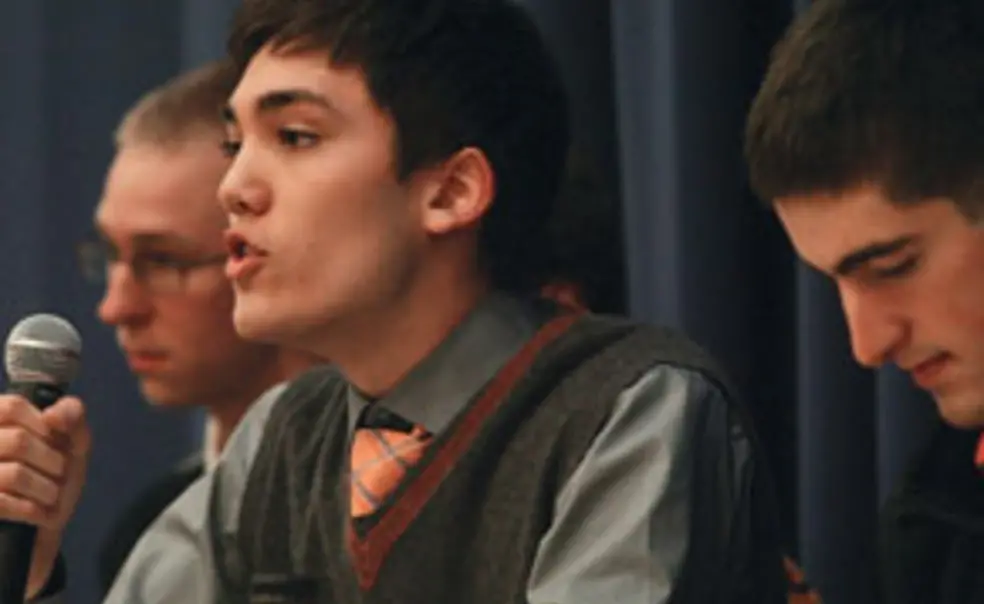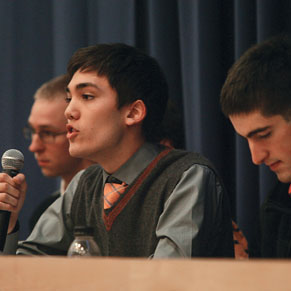Occupy Princeton protests create a stir on campus
After a slow start, Occupy Princeton has stepped up its presence on campus, interrupting recruiting sessions by two investment banks and defending its positions during a Whig Hall debate.
But it’s not the only voice being heard on issues of the economy, the influence of Wall Street, and the role of government regulators. Competing opinion columns in The Daily Princetonian have offered advice to the protesters and condemned their tactics, while attracting dozens of comments of their own. And the Princeton Corporate Finance Club, which promises to educate students about financial careers and “give you an edge in landing a job,” has attracted 400 members since it was launched in March.
The protests at campus information sessions given by JPMorgan Dec. 7 and Goldman Sachs the next day received widespread media attention, thanks to the popularity of the financial industry as an employer of Princeton graduates and the posting of videos of the events on YouTube. By mid-January, the videos had been viewed more than 125,000 times.
About 20 members of Occupy Princeton attended the sessions, questioning recruiters and conducting a “mic check” at each one: A leader read a series of statements such as “We protest the campus culture that whitewashes the crooked dealings of Wall Street as a prestigious career path,” and the statements were repeated in unison by other group members.
After each mic check, the protesters left the event. According to the Prince, Occupy Princeton was booed by other students attending the Goldman Sachs event.
“We are obviously not going to convince all of the [students at the] info session to agree with us,” said Derek Gideon ’12, a protest leader. “But we did present an alternate view that will hopefully change the culture on campus.”
Students quickly weighed in on the demonstrations in the pages of the Princetonian.
“It is true that the Princeton students of today traditionally become the Goldman partners of tomorrow, but chanting at them repetitively only serves to alienate them, not to change their minds,” wrote Aaron Applbaum ’14. “If we really want to make a difference, what ought to be on the forefront of everyone’s minds is the impending political race.”
Camille Framroze ’12, the executive editor of the Princetonian’s opinion section, said Occupy Princeton’s impact had been “very positive” in arousing a campus that tends to be politically apathetic, but added that “students are more likely to criticize Occupy Princeton than to support it, particularly after the mic checking.”
Robert Joyce ’13, an Occupy Princeton member, said he hoped that the group’s demonstrations had stirred discussions of the ethics of accepting a job on Wall Street. “That’s not to say that no one should go, but they should raise and grapple with the ethical issues before they do,” he said.
Beverly Hamilton-Chandler, director of Career Services, said she was unaware of any data to indicate a change in students’ career plans based on the Occupy movement, nor of changes in plans by recruiters to visit Princeton.
Joyce said about 10 Occupy Princeton members also conducted a mic check before an Orange Key campus tour group. The protest targeted the University’s investment in HEI Hospitality, an investment group that specializes in hotel turnarounds and that has drawn protests at a number of college campuses related to working conditions at HEI’s hotels.
Politics professor Mark Beissinger said he noticed “significant resonance of the issues raised by Occupy among students, but far less student interest in the movement than this resonance would seem to suggest.”
He said Princeton students are trying to understand the goals of the Occupy movement — not “for the sake of creating a counterculture, but for having some real impact on issues of inequality, injustice, and poverty.” But the group has been hurt by failing to spell out its program clearly and by its leaderless structure, he said.
Many of the points raised by Beissinger were cited during a Jan. 13 debate in Whig Hall in which five Occupy Wall Street supporters squared off against three students who took opposing viewpoints.
Pro-Occupy speakers attacked corporate greed and growing income inequality, saying that the movement’s goal is to end social injustice caused by a system that favors the rich. “Wall Street has used money to influence government policy in its favor, crippling real legislation that is meant to protect the consumer,” said Maria Krupenkin ’14.
Anti-Occupy panelists and some of the 50 students in the audience called the demands of the protest movement “scattered” and confusing. One audience member complimented the pro-Occupy team, however: “I think what you’re saying is a lot smarter than what the Occupy movement is spewing as a whole,” he said.
The debate was sponsored by the Corporate Finance Club. Anastasia Auber ’13, the club’s vice president of education, said that while she thought Occupy raised valid concerns, the two problems facing the movement are “its excessive focus on Wall Street, as opposed to the government, and its disorganization, which keeps it from accomplishing much.”
Wilson School Professor Stanley Katz, who moderated the debate, said he was encouraged to see how many Princeton students are thinking about the issues raised by the Occupy movement. “I think there is growing concern on this campus over the issue of the asymmetry of wealth in this country,” he said, “and I hope the most concerned students will find ways to put the concern to responsible use.”













No responses yet